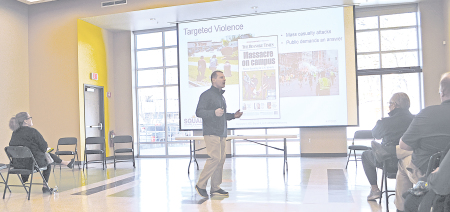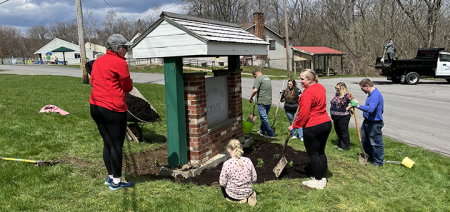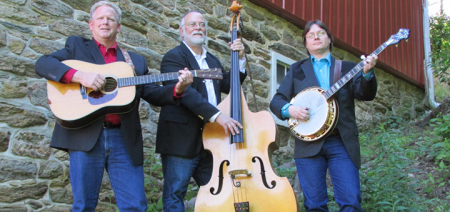New Berlin Veterinary Clinic Celebrates Grand Opening Of New Facility
Published:
April 23rd, 2025
By:
Tyler Murphy
 The New Berlin Veterinary Clinic will celebrate the grand opening of its brand new facility from 1 to 4 p.m. on Saturday, April 26. Pictured: Veterinarian Assistant Paris O’Dell, Customer Service Representative Markie Berkert, Dr. Linda Kennison, Customer Service Representative Shaylyn Thompsen, Dr Bill and Linda Johnson, Site Manager Bailey Terrano and Veterinarian Technician Dianne Santini. (Photo by Tyler Murphy)
The New Berlin Veterinary Clinic will celebrate the grand opening of its brand new facility from 1 to 4 p.m. on Saturday, April 26. Pictured: Veterinarian Assistant Paris O’Dell, Customer Service Representative Markie Berkert, Dr. Linda Kennison, Customer Service Representative Shaylyn Thompsen, Dr Bill and Linda Johnson, Site Manager Bailey Terrano and Veterinarian Technician Dianne Santini. (Photo by Tyler Murphy)
NEW BERLIN - After decades of serving the community by providing veterinary care in Chenango and Otsego counties, the New Berlin Veterinary Clinic will celebrate the grand opening of its brand new facility from 1 to 4 p.m. on Saturday, April 26.
The expansion marks a new chapter for the clinic, which traces its roots back to the mid-1960s and has grown into a regional network of practices operated by Drs. Bill and Lisa Johnson. Both are graduates of Cornell University’s veterinary program, class of 1986, where they first met. They have been married for 40 years.
“Increasing client demand and changing technology have caused us to outgrow the existing building despite having done extensive renovations,” said Bill.
The new building replaces the long-time facility just outside of the Village of New Berlin at 5094 State Hwy. 8.
The new clinic has a spacious reception room with separate dog and cat areas, six exam rooms, a dental suite, a triage area and dedicated rooms for radiology and ultrasound. New kennels have also been added inside.
The original building will now be repurposed into administrative offices.
“The community has been so supportive—that's how we've gotten to be where we are,” said Bill, who has been practicing veterinary medicine for over 40 years. “We’ve known many of our clients for decades—some for 30 years or more.”
The Johnsons began their veterinary journey in 1989 when they purchased the Pittsfield Veterinary Clinic, operating out of what Bill described as “a one-room cabin.”
In 2011, they acquired the New Berlin practice from retiring veterinarians, Dr. Richard Smith, Dr. Don Elliot and Dr. Dan Nelson. Since then, the operation has grown into a four-clinic enterprise employing around 80 staff, including 12 veterinarians. In 2021 the Pittsfield clinic closed and merged into the New Berlin clinic.
Their network now includes the New Berlin Veterinary Clinic, the Leatherstocking Veterinary Group in Pittsfield (primarily large animal), the Heritage Veterinary Clinic in Cooperstown, and Marcy Veterinary Clinic near Utica. The practices collectively serve a wide range of animals, including exotics, birds, pocket pets, and farm animals.
“We have about 16 active staff members in New Berlin alone,” Bill said. “It’s a general practice, and each doctor tends to develop a specialty. My wife, for example, sees chickens—people bring them from as far as Syracuse.”
Lisa said, “I love seeing multiple species in a day. I love the way people will bring in a chicken named Penny and treat it with the same love and respect as any other pet. I love the pocket pets, I like doing poultry, geese, ducks, things like that.”
The New Berlin clinic now averages 60 to 70 clients a day and performs 25 to 30 surgeries weekly, many of them routine. The team also partners with the local SPCA, assisting with care during animal cruelty cases. “Usually, a bunch of the horses end up at our place,” Bill said. “We can help find someone to care for them.”
While the New Berlin practice transitioned to mainly small animal care in 2018, the team continues to support large animal work occasionally. Johnson himself spent three decades working with livestock until he stepped away from large animal care due to the physical toll.
“By 2018, I was crawling up the stairs at home in pain,” he said. “Your shoulders, knees, and hips just wear down after 30 years of handling 1,200-pound animals.” Despite that, Johnson said large animal care was one of his favorite parts of the job. “I like cattle.” He said.
Today, Johnson focuses on surgery two days a week and sees patients one day a week. The practice includes partners Dr. Rachel Fraser and Dr. Kathy Mahon. Johnson said they are actively seeking three additional full-time veterinarians across their locations.
The April 26 grand opening will feature behind-the-scenes tours of the new facility, staff Q&A sessions, and vendor exhibits with giveaways, coupons, and product specials.
“Visitors will arrive in the lobby and be taken on guided walk-throughs,” Bill said.
Reflecting on his experiences, Bill said his interest in veterinary medicine began at 16. “I was thinking about becoming a doctor, but then I met this vet who told me, ‘You don’t want to be a human doctor—this is way more fun.’ I spent time with him in high school and thought, this is cool.”
Lisa said she was not allowed to have pets as a child, with a few small exceptions that made her only want to be around them more. “I have just always really loved animals.”
She remembered visiting a zoo as a child with her grandmother. “It was during a time of women can do anything and she said, ‘You could be an animal doctor if you want.’”
Looking ahead, Bill said the investment in the new building was an investment in improving future care. “We’re glad we can be here,” he said. “Hopefully, this is here for another 60 years. We are very grateful to the community; they built this place.”
Author: Tyler Murphy - More From This Author
Comments







